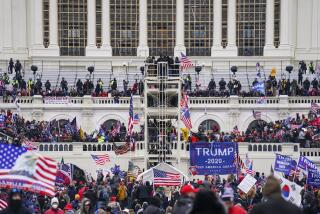Top Kurd Rebel Pleads for Life as Trial Begins
- Share via
MUDANYA, Turkey — Confounding even his most dedicated followers, Kurdish rebel chief Abdullah Ocalan pleaded for his life Monday at the opening of his trial on treason charges and offered to “serve the Turkish state in order to promote peace and brotherhood” between Turks and Kurds if he escapes a death sentence.
Appearing composed at first but becoming progressively more emotional, the leader of the outlawed Kurdistan Workers Party warned prosecutors during a rambling two-hour speech in his own defense that unless his life is spared, his followers will plunge this country into further bloodshed.
Seated inside a bulletproof glass cage, Ocalan said: “For peace and brotherhood, I am ready to serve the Turkish state, and for this end I must remain alive.”
The guerrilla leader, who was captured in a dramatic sting operation mounted by Turkish special forces in Nairobi, Kenya, on Feb. 15, is facing the death penalty for founding and leading the party known as the PKK, a Kurdish rebel group that has been fighting since 1984 for an independent state in Turkey’s heavily Kurdish southeast.
Turkey’s repressive policies toward a Kurdish population estimated at 12 million have helped feed the insurgency, which has spilled over the country’s borders into Kurdish-controlled northern Iraq.
Security measures have been drastically stepped up in this small coastal town in northwestern Turkey--the closest port to the prison island of Imrali in the Sea of Marmara, where the trial is being held--amid fears of a rebel attack. About 130 people attended Monday’s session, including Western diplomats and journalists who were fingerprinted and computer-scanned and permitted to carry only their wallets and their passports before boarding the ferry that carried them to the island. They were also made to pay $10 for a round-trip ticket.
Some fell asleep as a panel of judges at a converted movie theater read out a 139-page indictment cataloging a long list of crimes allegedly committed by the Kurdish warlord since he founded his movement in 1978. They include seeking to undermine the “indivisible unity of the Turkish state” as well as causing the deaths of thousands of unarmed civilians, many of them families of Kurds fighting on the side of the Turkish state.
Ocalan’s arrest has been widely hailed as a turning point in Turkey’s struggle against the rebels, who espouse Marxist rule. The conflict has claimed more than 30,000 lives and has cost the Turkish state nearly $100 billion. Ocalan said Monday that if given a chance, he could “bring down my men from the mountains in three months” and work “for a peaceful and democratic solution to the Kurdish problem.” A Turkish official shrugged off the offer as “pure blackmail.”
Dressed in a dark gray jacket, blue shirt and khakis, Ocalan apologized to the relatives of Turkish soldiers killed in the conflict. Some of those family members who attended Monday’s session brought framed pictures of their loved ones and large Turkish flags.
“I share the grief of the families of the martyrs, and I promise that I will from here on work for the establishment of peace,” he said.
Images repeatedly broadcast on Turkish television showed Ocalan standing up and gesturing energetically as he sought to persuade the prosecution of the need to keep him alive if further violence is to be averted.
“If he was going to say all of this, why did he bother rebelling against the state in the first place? Why did he cause so many deaths?” asked Hashim Hashimi, an ethnic Kurdish lawmaker, echoing the sentiments of many Kurds interviewed here in the wake of the hearing.
The real cause of the Kurdish conflict, Ocalan said, lies in the Turkish state’s failure to address the demands of its Kurdish minority for greater cultural and political rights. If these are not met, violence will continue long after his death, he warned.
Few observers here believed that Ocalan’s overtures will affect the outcome of what his defense team refers to as “the trial of the century.”
“He will be hanged for sure,” said one Western official. “But instead of dying the hero his followers believe him to be, he will go down in history as a thoroughly discredited man.”
The inclusion of an ultranationalist group in a coalition government formed by Turkey’s leftist prime minister, Bulent Ecevit, last week bodes ill for the rebel chief. The party, which came in a surprising second in parliamentary elections April 18, has been campaigning for Ocalan’s execution.
International human rights groups have voiced strong concerns about the fairness of the trial, citing the presence of a military officer on the panel of three presiding judges along with a campaign of sustained harassment against Ocalan’s lawyers. Some were beaten during a pretrial hearing last month by police officers who had been assigned to protect them. One of them was charged last week with being a PKK member himself.
Two members of Ocalan’s defense team announced Monday that they were pulling out of the trial, saying the case against their client was being conducted unlawfully.
More to Read
Sign up for Essential California
The most important California stories and recommendations in your inbox every morning.
You may occasionally receive promotional content from the Los Angeles Times.













